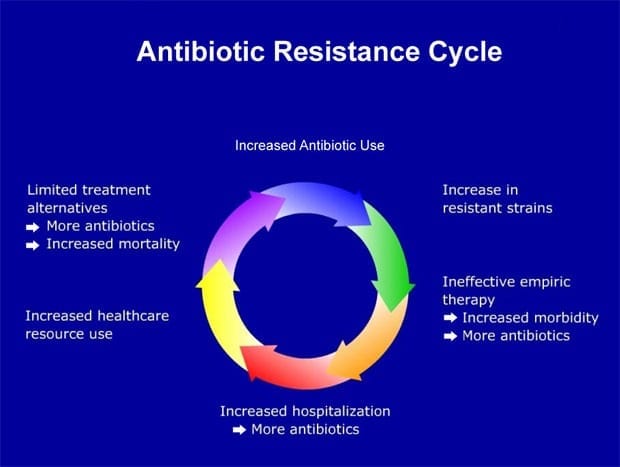
TAU researcher’s novel strategy may sensitize bacteria to antibiotics to selectively kill antibiotic-resistant bacteria
At its annual assembly in Geneva last week, the World Health Organization approved a radical and far-reaching plan to slow the rapid, extensive spread of antibiotic resistance around the world. The plan hopes to curb the rise caused by an unchecked use of antibiotics and lack of new antibiotics on the market.
New Tel Aviv University research published in PNASintroduces a promising new tool: a two-pronged system to combat this dangerous situation. It nukes antibiotic resistance in selected bacteria, and renders other bacteria more sensitive to antibiotics. The research, led by Prof. Udi Qimron of the Department of Clinical Microbiology and Immunology at TAU’s Sackler Faculty of Medicine, is based on bacterial viruses called phages, which transfer “edited” DNA into resistant bacteria to kill off resistant strains and make others more sensitive to antibiotics.
According to the researchers, the system, if ultimately applied to pathogens on hospital surfaces or medical personnel’s hands, could turn the tide on untreatable, often lethal bacterial infections. “Since there are only a few pathogens in hospitals that cause most of the antibiotic-resistance infections, we wish to specifically design appropriate sensitization treatments for each one of them,” Prof. Qimron says. “We will have to choose suitable combinations of DNA-delivering phages that would deliver the DNA into pathogens, and the suitable combination of ‘killing’ phages that could select the re-sensitized pathogens.”
Reprogramming the system
“Antibiotic-resistant pathogens constitute an increasing threat because antibiotics are designed to select resistant pathogens over sensitive ones,” Prof. Qimron says. “The injected DNA does two things: It eliminates the genes that cause resistance to antibiotics, and it confers protection against lethal phages.
“We managed to devise a way to restore antibiotic sensitivity to drug-resistant bacteria, and also prevent the transfer of genes that create that resistance among bacteria,” he continues.
Earlier research by Prof. Qimron revealed that bacteria could be sensitized to certain antibiotics — and that specific chemical agents could “choose” those bacteria more susceptible to antibiotics. His strategy harnesses the CRISPR-Cas system — a bacterial DNA-reprogramming system Prof. Qimron pioneered — as a tool to expand on established principles.
Read more: Programming DNA to Reverse Antibiotic Resistance in Bacteria
The Latest on: Programming DNA
[google_news title=”” keyword=”Programming DNA” num_posts=”10″ blurb_length=”0″ show_thumb=”left”]
via Google News
The Latest on: Programming DNA
- Broadway DNA Acquires D'ILLUSION: The Houdini Musical and HYPATIA AND THE HEATHENSon April 26, 2024 at 12:28 pm
Broadway DNA announces the acquisition of two acclaimed new musicals, D'ILLUSION: The Houdini Musical by Bálint Varga and Lia Tamborra, and Hypatia and the Heathens, a historical tragicomic musical by ...
- New DNA discovered in brutal murder case of elderly couple at Lake Oconeeon April 25, 2024 at 4:43 pm
Putnam County Sheriff Howard Sills says evidence was initially sent to the GBI state crime lab for processing. Law enforcement only found DNA from the victims at the time.
- Applied DNA Awarded Contract by HDT Bio For Rapid Vaccine Development Programon April 25, 2024 at 5:24 am
Under the terms of the contract, Applied DNA will supply Linea™ DNA IVT templates to HDT Bio for use in conjunction with its LION™ formulated repRNA (self-replicating RNA) vaccination platform. The ...
- How Georgia's 'championship DNA' prepared Ladd McConkey for the next levelon April 24, 2024 at 11:04 am
During an appearance on FanSided's "Stacking the Box Podcast" with Sterling Holmes, Georgia wide receiver Ladd McConkey discussed how playing for Georgia prepared him for the NFL.
- Researchers create first artificial, modifiable cells with programmable DNAon April 24, 2024 at 8:08 am
The achievement holds significant promise for advancements in regenerative medicine, drug delivery methods, and diagnostic technologies.
- Home Run Heroes: Truist program gives $100 to Developing Neighborhood Athletes fund for each Texas softball home runon April 24, 2024 at 8:00 am
Home runs can not only make an impact on the outcome of a softball game, but also on the community. With every home run hit during Texas softball’s season, Truist Bank donates $100 to the Developing ...
- Vast DNA tree of life for plants revealed by global science team using 1.8 billion letters of genetic codeon April 24, 2024 at 8:00 am
A new paper published today (April 24) in the journal Nature by an international team of 279 scientists led by the Royal Botanic Gardens, Kew presents the most up-to-date understanding of the ...
- Quantum Computing Meets Genomics: The Dawn of Hyper-Fast DNA Analysison April 24, 2024 at 1:59 am
A new project unites world-leading experts in quantum computing and genomics to develop new methods and algorithms to process biological data. Researchers aim to harness quantum computing to speed up ...
- A CT woman’s remains will orbit the sun forever. Celebrity’s DNA accompanies her.on April 23, 2024 at 2:30 am
Besides the DNA from hair follicles of Washington and Kennedy, there are small discs contain cremated remains of “Star Trek” creator Gene Roddenberry, his wife, Majel Barrett Roddenberry, Nichelle ...
- How a Cloned Ferret Inspired a DNA Bank for Endangered Specieson April 22, 2024 at 5:22 am
The birth of a cloned black-footed ferret named Elizabeth Ann, and her two new sisters, has sparked a new pilot program to preserve the tissues of hundreds of endangered species “just in case” ...
via Bing News










